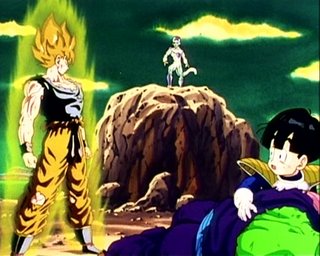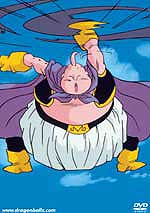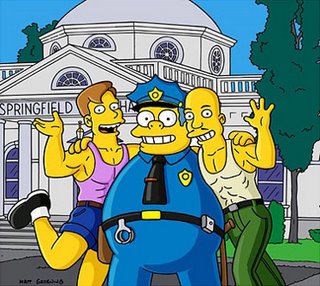Here's your lesson for the day: Controlled forest fires. They're used to renew forests by encouraging desirable trees to grow - sequoia seeds need to be broken out of their coating by fire - and reducing the chance of uncontrollable, more damaging forest fires because it culls the slash - the undesirable, dead parts of the forest that are basically just barrels of fuel - and encourages the growth of trees that are fire-resistant. Wildfires occur naturally for these reasons. It's the oldest rule in nature: survival of the fittest. Elimination of the weakest. While Social Darwinism sucks, evolutionary Darwinism can't really be denied.
What got me thinking about this is actually fandoms I have that have long since outlived their heydays and are, effectively, just humiliating themselves at this point by continuing. I'll name some common examples that have been oft-cited by other culture critics (i.e., people like The Comic Book Guy in The Simpsons who have nothing better to do with their time than sit on their ass and watch TV, then rant about it on the internet. Or better yet, watch TV on the internet): The Simpsons (this post sort of has a Simpsons theme, doesn't it?)... Friends... the West Wing... actually, pretty damn near every television show that follows any kind of plot line. Eventually those plot lines become stale, recycled, hackneyed, parodied, or just abandoned for... no plot at all, or a completely nonsensical one.
TV shows, you see, have life cycles, just like everything else:
1) Infancy - unless they are Prodigies*, the TV show will probably suck at this age, no pun intended. The dialogue will be forced and/or overly quirky, the quality of the production will be subpar, the pacing uncomfortably slow, and there will be some scenes that devoted fans will later look back on and think - what the fuck were they thinking? (see the X-Files episode of season 1 where Scully's all paranoid that there's something on her back and she takes off her garments so Mulder can examine her. Uh...?) Unless the characters, concept, or humor/drama are enough to sustain a following that will petition the network to keep the show on the air, it will die. Sorry, it's a harsh world.
2) Childhood/Adolescence - the show "comes into its own". The devoted following starts telling everyone how great it is. It will appear on the cover of TV Guide, if it's on a mainstream network. It starts to develop its hooks to keep the devoted following happy and lure others into the cult of the devoted following. This would be the Ross and Rachel season of Friends, which is the only one to spawn the one-liner that everyone in the world can quote, "WE WERE ON A BREAK", and the sublime seasons 2 and 3 of the X-Files, featuring the great 3-part cliffhanger that started with "Anasazi", subliminal messages of the government in "Wetwired" leading to Mulder's ode to Scully: "You're the only one I trust", and the absolutely superb season finale, "Talitha Cumi".
 The X-Files just isn't the X-Files without Mulder threatening to kill the Cigarette Smoking Man for something Cancer Man did to his parents/Scully/an innocent bystander/aliens/the world.
The X-Files just isn't the X-Files without Mulder threatening to kill the Cigarette Smoking Man for something Cancer Man did to his parents/Scully/an innocent bystander/aliens/the world.3) Primetime/Maturity - the show knows it's hot, and flaunts it. The devoted following is now no longer a weird cult, but an accepted community, just like the Girl Scouts - like moving up from Jehovah's Witnesses status to, you know, Lutherans. They have been on several covers of TV Guide as well as Entertainment Weekly, and its stars are featured in People magazine, giving interviews about how normal they are and how they really do eat 3000 calories a day, they swear (Ellen Pompeo of Grey's Anatomy, I'm lookin' at you). Entertainment Tonight trips over itself trying to sound like they know what's going on in the show. News anchors make fleeting references to it -- "Wow, sounds like something out of the X-Files" -- and contests may spring up offering the chance to visit the cast and crew, or win some makeover that will turn you, too, into a Desperate Housewife. In terms of the show's quality, it's now so full of its own ego that it can make fun of itself artfully, circle back on old jokes, and still come up with fresh ones, the whole time rewarding the devoted following and at the same time opening its arms to those fools who are only just now joining it. There are, rarely, Elitists** who do not open their arms to new followers. Basically, the show thinks it's quite clever, and not only that, but it ushers in a new cultural era for the United States. Stuff that would never fly in the Senility phase is cool right now - yes, Ross can yet again fail to move on from his relationship with Rachel by saying the wrong name... twice. Yes, Mulder and Scully can get trapped in a haunted house for no reason and start trying to kill each other on behest of the ghosts (this episode, "How The Ghosts Stole Christmas", is a fan favorite, despite having the worst X-Files plot I've ever seen). Appropriately, Maturity is also the best time for spin-offs (aww, look at all those cute li'l Law & Orders).
4) Old Age/Senility - the show chooses to bow out gracefully or go out a kicking and screaming curmudgeon/cat-lady. An overwhelming majority, sadly, go out as curmudgeons and cat-ladies instead of ladies and gentlemen. Ideally, the TV show would reach its conclusion early on in Old Age - i.e., right after Prime Time ends - give a satisfying resolution wrapping up all plot lines (except if they insist on being cheeky and letting some hang), and exit, to the applause of all. I can't actually think of a show that has done this, sadly enough. More often, Senility develops. I'll get into that later. As a cultural icon, the TV show loses its hipness and becomes a "time marker". The X-Files is so '90s. The Friends Era is past. My mother watched E.R. And so on, so forth. References to it are now jokes. The devoted following loses membership for various reasons. Criticism of the show rises. The suits at the network start wondering if it's time to pull the plug.
 Guys, George Clooney was on E.R. like 200 years ago, and he's still the only one anyone can think of when they hear "E.R."
Guys, George Clooney was on E.R. like 200 years ago, and he's still the only one anyone can think of when they hear "E.R."Now that's Senility for you.
5) Death - well, pretty self-evident. It's off not only its home network, but all networks. It should be noted that some TV shows suffer "terminal illnesses" before senility and death, but recover, when they get booted by their original network and then get picked up to great popularity by a new network. Best Example: Family Guy (Fox to Cartoon Network to Torch-Bearer of American Animation). That's not death - death is final. Sometimes ghosts will linger in the form of reruns, but eventually even those subside. Now it's just the devoted following (and the most devoted of the devoted, too) who give a shit about the show at all. Hell, the actors probably care less than the most devoted of the devoted following.
*- Prodigies: shows that become hugely popular in their first year, basically going right into late Adolescence/early Primetime. Quite common for reality TV, like American Idol, and rare for dramas/comedies, although it still happens once in a while: Grey's Anatomy.
** - Elitists: shows that don't let their devoted following grow, because there's too many complications and inside jokes that new viewers "just wouldn't understand". Often these shows are advertised with the tagline "If you haven't been watching [TV Show]..." followed by some insult about your mother or a threat involving crocodiles. Examples: The Office, 24.
The only television shows that are exempt from Curse of Senility, as far as I can tell, are British murder mysteries, and perhaps American crime dramas. Midsomer Murders and Poirot will always have new episodes and will always be watched, on both sides of the Atlantic, because they are so formulaic and have such brilliant writers that things like maximum commitment don't matter. These shows don't have any evolving plot with the characters. Even when the characters try to develop, their efforts are quashed and they're brought back into line (see Hastings' short-lived endeavour in South America and wedded bliss. Riiiight. Just go crawling back to Poirot, Hastings). These shows have one star without whom the show would die, and in fact, that is how these shows die - the star dies. I mean, no one else can be Poirot. When David Suchet kicks the bucket, so will Poirot. Until then, it will be comfort television for bookish homebodies everywhere. Although interestingly, the American version, exemplified by Law & Order and CSI, may have gotten around this death clause by changing casts so frequently that they're "real life shows" and don't need a stable cast to keep going, because they don't even rely on a star, they rely on a formula, and a formula alone. These shows' popularity often fluctuates, and will probably never be as great as the popularity of shows with normal life cycles (CSI being the notable exception, and thus making me doubt if CSI actually fits this category), but hey, they'll live forever, so pick your poison.
 Just as Joe Paterno will die on the field, so will David Suchet die on the set of Poirot.
Just as Joe Paterno will die on the field, so will David Suchet die on the set of Poirot.Senility: Case Studies
These are all TV shows I have, at some point or another (and perhaps still yet!) loved. Then they went senile, and I'm going to visiting hours at the nursing home.
1) Let's-Drag-This-Out-As-Loooong-As-Possible-Itis
The show that would NEVER END. When Scully was abducted, that took what, three episodes. When Mulder was abducted? Two seasons. Mulder's parents were dead pretty early on. So then they had to kill off Scully's family, for no reason. Because us stupid fans wanted to know what the hell the aliens were going to do and when they were going to show up, we kept watching despite a huge drop in quality in the later seasons. When you're so out of material that you're having your actors come up with new episodes (bad idea, Chris Carter), it's time to just let your poor devoted following know everything they need to know and stop taunting us with tiny hints that don't actually amount to anything.
High Point: Seasons 2-3. When we actually were learning new things, the characters were compelling, and it seemed to be going somewhere, and most importantly, there were monsters like the dude that ate livers, the fluke man, and the horrific Peacock family.
Oh No They Didn't Point: Tonight on the X-Files, follow Agents Doggett and Reyes as they... wait, hold up! Who?
2) Oops-We-Ran-Out-of-Plot-Itis
Example: Dragonball Z
Here's the thing about arcs. If you don't stop when you reach the other end of the arc, you're basically just digging yourself into the ground, because you don't have anything new to say, and you can't go up, because you're not a fucking slinky. The great plot arc that began when we found out our beloved Goku was an alien was completed when he avenged the (nearly extinct) species by killing Freeza. It would have made a great ending point, right there. But nooo, greedy producers wanted more moola, so they told Akira Toriyama to keep on drawing panels featuring villains named after nursery rhymes. When the series' creator wants to stop, dudes, maybe you should let him.
High Point: Clearly the emotional final battle on Namek. Few stories have had as clear a climax as this.
Oh No They Didn't Point: The Fusion Dance? What the fuck? No human would ever debase themselves by doing this dance, let alone a saiyan. And the entire Buu saga? Ouch.
3) Decided-to-Go-on-Crack-Itis
Example: Charmed
Most people will say that they watched an episode (or season) or two of the charming, kitschy Charmed, but if you ask "what happened in the end?" the conversation will invariably turn into "Whatever happened to Baby Charmed?" That's because people stopped watching when the show's producers went on crack. Most will say this happened when Shannon Doherty's witch, Prue, "died". Then suddenly we weren't just being normal witches... no, no, we had genies, Greek goddesses (Phoebe turns into the Goddess of Love? WHAT? And sorry, producers, but "Goddess of Earth" is not something out of Greek mythology), leprechauns, way too much complexity for a TV show mixed in with gimmicky stupidity. But I guess that's what you get when the stars are dating the producers and you have three alpha females jockeying for screen time.
High Point: Prue telling Phoebe to shut the fuck up in Seasons 1-3.
Oh No They Didn't Point: Phoebe turns into a mermaid? WHY?
4) I'm-Not-Funny-Anymore-Itis
Example: The Simpsons
The Simpsons used to be great, but let's face it - it's been on for eighteen years, almost as old as I am, and you just can't be funny for that long. Since the show's writers have used up all their funny potions, they are now turning to random weirdness that belongs more in an episode of Aqua Teen Hunger Force than in a satire about middle America, gratuitous and painful stabs at current events (if the knife ain't sharp, it's not cool, it's just nasty). I think The Simpsons was better when they tried to address unchanging conditions of humanity, not the headlines of USA Today. Remember the gay marriage episode? Do you remember the crickets?
High Point: Seasons 4-8, featuring "Homer the Heretic", "Who Shot Mr. Burns?", and "Homer's Enemy", some of my favorites. Especially "Homer the Heretic". Damn, I love their religious episodes.
Oh No They Didn't Point: Sorry, but "There's Something About Marrying" of season 16 made me want to shoot myself.
5) Now-That-I'm-Old-I-Shall-Be-Perfect-Itis
Example: Friends
Friends used to be soooo much more amusing than it ended up being, and I think it's because it just got too goddamn sappy at the end, with them all moving to the suburbs (or L.A., in Joey's case) and having babies. I mean, is that how life actually works out? No. I know Friends has never been known for realism, but it was much more amusing when Ross was receiving chopped roses from Emily, Rachel was being dumped by commitment-phobes, Phoebe had no money, and Joey had no job. They were too flawed to deserve "perfect" endings.
High Point: Seasons 2-4. Friends was great in the beginning because it was so damn insane and awful to its characters. Remember Chandler's roommate Eddie? Rachel singing "Her Name was Lola" at Barry's wedding? Those were the days.
Oh No They Didn't Point: The whole love triangle with Joey, Rachel, and Ross. What is this, Days of our Fucking Lives?
That's all, folks. Remember, when your favorite TV show has its best season yet, write to the network and ask them to please cancel it.
These are all TV shows I have, at some point or another (and perhaps still yet!) loved. Then they went senile, and I'm going to visiting hours at the nursing home.
1) Let's-Drag-This-Out-As-Loooong-As-Possible-Itis
The show that would NEVER END. When Scully was abducted, that took what, three episodes. When Mulder was abducted? Two seasons. Mulder's parents were dead pretty early on. So then they had to kill off Scully's family, for no reason. Because us stupid fans wanted to know what the hell the aliens were going to do and when they were going to show up, we kept watching despite a huge drop in quality in the later seasons. When you're so out of material that you're having your actors come up with new episodes (bad idea, Chris Carter), it's time to just let your poor devoted following know everything they need to know and stop taunting us with tiny hints that don't actually amount to anything.
High Point: Seasons 2-3. When we actually were learning new things, the characters were compelling, and it seemed to be going somewhere, and most importantly, there were monsters like the dude that ate livers, the fluke man, and the horrific Peacock family.
Oh No They Didn't Point: Tonight on the X-Files, follow Agents Doggett and Reyes as they... wait, hold up! Who?
2) Oops-We-Ran-Out-of-Plot-Itis
Example: Dragonball Z
Here's the thing about arcs. If you don't stop when you reach the other end of the arc, you're basically just digging yourself into the ground, because you don't have anything new to say, and you can't go up, because you're not a fucking slinky. The great plot arc that began when we found out our beloved Goku was an alien was completed when he avenged the (nearly extinct) species by killing Freeza. It would have made a great ending point, right there. But nooo, greedy producers wanted more moola, so they told Akira Toriyama to keep on drawing panels featuring villains named after nursery rhymes. When the series' creator wants to stop, dudes, maybe you should let him.
High Point: Clearly the emotional final battle on Namek. Few stories have had as clear a climax as this.
Oh No They Didn't Point: The Fusion Dance? What the fuck? No human would ever debase themselves by doing this dance, let alone a saiyan. And the entire Buu saga? Ouch.
3) Decided-to-Go-on-Crack-Itis
Example: Charmed
Most people will say that they watched an episode (or season) or two of the charming, kitschy Charmed, but if you ask "what happened in the end?" the conversation will invariably turn into "Whatever happened to Baby Charmed?" That's because people stopped watching when the show's producers went on crack. Most will say this happened when Shannon Doherty's witch, Prue, "died". Then suddenly we weren't just being normal witches... no, no, we had genies, Greek goddesses (Phoebe turns into the Goddess of Love? WHAT? And sorry, producers, but "Goddess of Earth" is not something out of Greek mythology), leprechauns, way too much complexity for a TV show mixed in with gimmicky stupidity. But I guess that's what you get when the stars are dating the producers and you have three alpha females jockeying for screen time.
High Point: Prue telling Phoebe to shut the fuck up in Seasons 1-3.
Oh No They Didn't Point: Phoebe turns into a mermaid? WHY?
4) I'm-Not-Funny-Anymore-Itis
Example: The Simpsons
The Simpsons used to be great, but let's face it - it's been on for eighteen years, almost as old as I am, and you just can't be funny for that long. Since the show's writers have used up all their funny potions, they are now turning to random weirdness that belongs more in an episode of Aqua Teen Hunger Force than in a satire about middle America, gratuitous and painful stabs at current events (if the knife ain't sharp, it's not cool, it's just nasty). I think The Simpsons was better when they tried to address unchanging conditions of humanity, not the headlines of USA Today. Remember the gay marriage episode? Do you remember the crickets?
High Point: Seasons 4-8, featuring "Homer the Heretic", "Who Shot Mr. Burns?", and "Homer's Enemy", some of my favorites. Especially "Homer the Heretic". Damn, I love their religious episodes.
Oh No They Didn't Point: Sorry, but "There's Something About Marrying" of season 16 made me want to shoot myself.
5) Now-That-I'm-Old-I-Shall-Be-Perfect-Itis
Example: Friends
Friends used to be soooo much more amusing than it ended up being, and I think it's because it just got too goddamn sappy at the end, with them all moving to the suburbs (or L.A., in Joey's case) and having babies. I mean, is that how life actually works out? No. I know Friends has never been known for realism, but it was much more amusing when Ross was receiving chopped roses from Emily, Rachel was being dumped by commitment-phobes, Phoebe had no money, and Joey had no job. They were too flawed to deserve "perfect" endings.
High Point: Seasons 2-4. Friends was great in the beginning because it was so damn insane and awful to its characters. Remember Chandler's roommate Eddie? Rachel singing "Her Name was Lola" at Barry's wedding? Those were the days.
Oh No They Didn't Point: The whole love triangle with Joey, Rachel, and Ross. What is this, Days of our Fucking Lives?
That's all, folks. Remember, when your favorite TV show has its best season yet, write to the network and ask them to please cancel it.


























